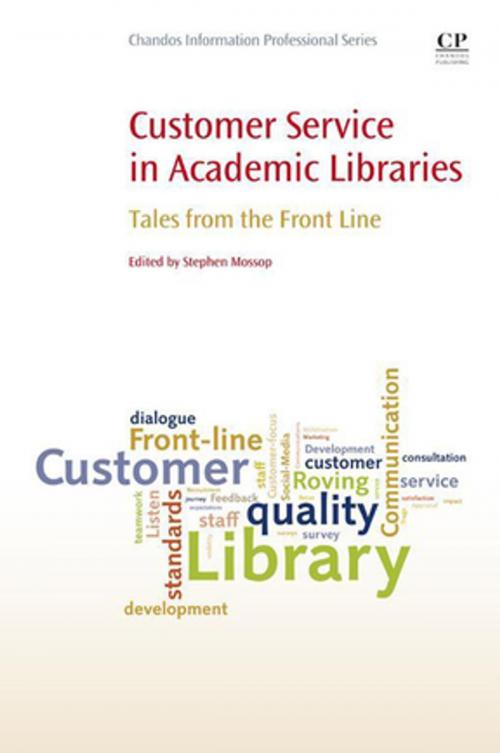Customer Service in Academic Libraries
Tales from the Front Line
Nonfiction, Reference & Language, Language Arts, Library & Information Services, Reference| Author: | Stephen Mossop | ISBN: | 9781780634395 |
| Publisher: | Elsevier Science | Publication: | October 6, 2015 |
| Imprint: | Chandos Publishing | Language: | English |
| Author: | Stephen Mossop |
| ISBN: | 9781780634395 |
| Publisher: | Elsevier Science |
| Publication: | October 6, 2015 |
| Imprint: | Chandos Publishing |
| Language: | English |
The term 'customer service' is not new to the academic library community. Academic libraries exist to serve the needs of their community, and hence customer service is essential. However, the term can be applied in a variety of ways, from a thin veneer of politeness, to an all-encompassing ethic focussing organisational and individual attention on understanding and meeting the needs of the customer. For customers, the library’s Front Line team is the ‘human face’ of the library. How well they do their job can have a massive impact on the quality of the learning experience for many students, and can directly impact upon their success. The importance of their role, and the quality of the services they offer, should not be underestimated – but in an increasingly digital world, and with potentially several thousand individuals visiting every day (whether in person or online), each with their own agendas and requirements, how can the library’s Front Line team deliver the personal service that each of these individuals need? Customer Service in Academic Libraries contributes to what academic libraries, as a community, do really well - the sharing of best practice. It brings together, in one place, examples of how Front Line teams from libraries across a wide geographical area - Hong Kong, Australia, Turkey and the United Kingdom – work to ‘get it right for their customers’. Between them, they cover a range of institutions including research-intensive, mixed HE/FE, private establishments and shared campuses. All have their own tales to tell, their own emphases, their own ways of doing things – and all bring their own examples of best practice, which it is hoped readers will find useful in their own context.
- Discusses ‘customer service’ in a library setting
- Translates ‘management theory’ into useful practice information
- Examines building relationships, meeting customer needs, and marketing and communication
- Provides examples of practical experience grounded in recent, transferable experience
The term 'customer service' is not new to the academic library community. Academic libraries exist to serve the needs of their community, and hence customer service is essential. However, the term can be applied in a variety of ways, from a thin veneer of politeness, to an all-encompassing ethic focussing organisational and individual attention on understanding and meeting the needs of the customer. For customers, the library’s Front Line team is the ‘human face’ of the library. How well they do their job can have a massive impact on the quality of the learning experience for many students, and can directly impact upon their success. The importance of their role, and the quality of the services they offer, should not be underestimated – but in an increasingly digital world, and with potentially several thousand individuals visiting every day (whether in person or online), each with their own agendas and requirements, how can the library’s Front Line team deliver the personal service that each of these individuals need? Customer Service in Academic Libraries contributes to what academic libraries, as a community, do really well - the sharing of best practice. It brings together, in one place, examples of how Front Line teams from libraries across a wide geographical area - Hong Kong, Australia, Turkey and the United Kingdom – work to ‘get it right for their customers’. Between them, they cover a range of institutions including research-intensive, mixed HE/FE, private establishments and shared campuses. All have their own tales to tell, their own emphases, their own ways of doing things – and all bring their own examples of best practice, which it is hoped readers will find useful in their own context.
- Discusses ‘customer service’ in a library setting
- Translates ‘management theory’ into useful practice information
- Examines building relationships, meeting customer needs, and marketing and communication
- Provides examples of practical experience grounded in recent, transferable experience















